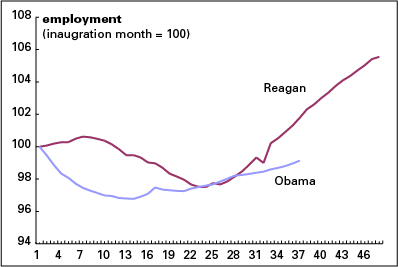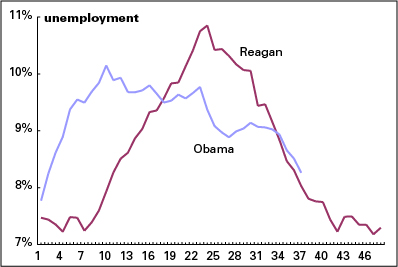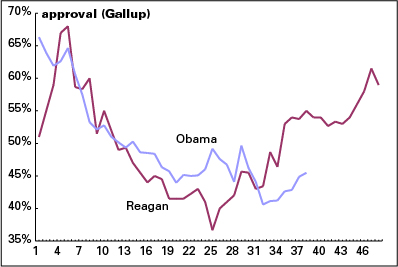Morning again in America?
So it looks like Obama plans to sing from the Reagan songbook for his campaign—specifically from the "Morning in America" pages. In case you were too young the first time around, or now are too old to remember, the original went something like this:
The logic is this: Reagan got re-elected during the recovery after a deep recession, so Obama can do the same. Also, Reagan whipped Grenada's ass and Obama killed Osama.
Foreign victories don't count for much in election campaigns but economic conditions count a lot. So how bright is Obama's morning compared to Reagan's?
TPM took a look at this question earlier today (Is It Morning — Or Dawn — In America?), but in a very incomplete way. Here's a broader look. And the answer is: not as bright as 1984, actually.
For most people, what matters most is the job market. And the job market
First, total employment.
Both presidents endured sharp hits to employment (though for Obama, the declines extended those of his predecessor). Obama's hit was earlier and deeper than Reagan's. But Obama's recovery has been weaker. By Reagan's 37th month in office, employment was nearly 2% where it was when he was inaugurated; for Obama, employment is still down almost 1%.
Now unemployment.
Reagan suffered a higher and later peak in unemployment (10.8% in month 23, compared to Obama's 10.1% in month 10), but enjoyed a much steeper drop. As of the 37th month, Reagan's unemployment rate was 8.0%, a decline of 2.4 points from a year earlier. Obama's 8.3% is just 0.8 point down from a year earlier. And Obama's unemployment rate is worse than it looks, since vast numbers of people have dropped out of the labor force and therefore aren't counted as unemployed. In the year before Reagan's 37th month, the participation rate—the employed plus the unemployed as a share of the adult population—rose by 0.1 point, as people were drawn into an improving job market. Obama's, however, is off by 0.5 point, as people discouraged by job prospects give up on the search.
As LBO has shown in the past, you can explain most post-World War 2 presidential elections using a model consisting of just two variables—inflation-adjusted after-tax income per capita and presidential approval. If income is positive and approval over 50%, the incumbent or another member of his party is highly likely to win. Things are not looking so good for Obama on that score—though the model is best when run with numbers for the spring, not the late winter.
Here's the income comparison. (Officially the measure is known as real disposable personal income [DPI] per capita.)
DPI took a much sharper hit under Obama than Reagan, and has been flat for a year-and-a-half. DPI is still 0.4% below where it was when Obama took the oath of office. The comparable figure for Reagan is up nearly 8%. DPI is an average, and can be distorted upwards by action at the high end, but it's still a decent broad measure, and by that measure, Obama's doing very badly. (Not that it's his personal fault, of course.)
And how about approval? On that, Obama's doing a little better than might be expected given those crummy income numbers—but still, Reagan was 9 points ahead of Obama (54% vs. 45%). And Reagan was up 17 points over the previous year—Obama's down 4.
So is it morning once again in America? Not really. Predawn maybe.




No comments:
Post a Comment
Comments